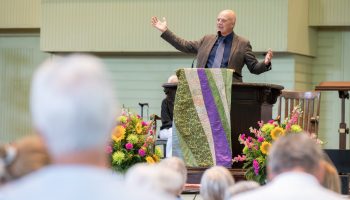Kaitlyn Finchler
Contributing writer

When religion is introduced to political conversations, it can often be wondered who it’s for — the people, the religious leaders or the politicians. When religious extremism is presented in political situations, it can be a dangerous play at the very foundations of American democracy.
Matthew D. Taylor, senior scholar at the Institute for Islamic, Christian and Jewish Studies, will deliver his lecture “Christian Extremism is at the Heart of Our Democratic Crisis; And the Jan. 6 Capitol Riot Reveals It” at 2 p.m. today in the Hall of Philosophy, closing the Week Six Interfaith Lecture Series theme “Religion’s Role in Conflict and Extremism.”
“The lecture really comes out of the book I published this past October, called The Violent Take It by Force,” Taylor said. “The book is trying to understand the Capitol riot and the religious forces behind it. I focus on a specific network of leaders called the New Apostolic Reformation, sometimes called the NAR.”
The NAR, Taylor said, is what some scholars would call “independent, charismatic Christianity,” which is a subculture within evangelicalism — or a nondenominational wing of Pentecostalism.
“I show in the book how the NAR became some of the most influential Christian voices supporting Donald Trump and became integral to the first administration,” he said. “They were of the major organizing forces for Jan. 6, and their theology has become incredibly popular in the Trump era.”
Beyond the Jan. 6, 2021, insurrection, the NAR played a “very central role” in the 2024 election and helped Trump get reelected, Taylor said.
“I want to be clear that I think one of the greatest strengths of American history and American society is this genius idea of the founding fathers and founding generation to separate religion from the state,” he said. “We allow our political leaders to speak from their religious voices, to use their theological and other vocabularies in their political conversation.”
There’s a “widespread recognition” of two different sectors in American society — a religious sector and a governmental sector, Taylor said.
“Most Americans feel pretty comfortable having those be recognized as different and distinct,” he said. “What is happening now, as you have more and more religious voices injecting not just theology, but political theology — politicized theology, theology about leaders like Donald Trump — … it toxifies both the politics conversation and the religion conversation.”
For the religion conversation, Taylor said part of the “brilliance” of separating religion and state is that, historically, religion offers a “very powerful vocabulary and gravitas and sense of meaning” to people.
“It is very easy for cynical political actors to try to take over religious vocabularies in order to create their own cults of personality around themselves,” Taylor said. “That does great harm to religious communities because, ideally, they come to religion for the sake of meaning, but there are people who want to use it for power.”
The United States is “still very much” a majority Christian nation, in which Christianity exerts “great privilege and power,” he said.
“When Christians start to blend their political identities with their religious identities and claim that God is now involved in American politics, then we are moving away from democracy,” Taylor said. “We are moving away from pluralism into a quasi-religious state.”
Taylor said his hopes the audience comes away “better informed” from his lecture about the “actual actors and real leaders” who are driving this moment and the “real threat” they pose.
“I hope they come away inspired to do something about it,” he said.
As much as his research shows “we are in a very dire moment as a democracy,” if the move into this “populist, authoritarian mode” is not reversed, there’s still “a lot we can do,” he said.
“The values that got us here are the values that can get us out of the situation,” Taylor said. “If we lean into them, if we lean into pluralism, if we lean into unity, if we lead into the separation of church and state, I think that can provide a path out of the quagmire that the MAGA movement is leading us into.”




